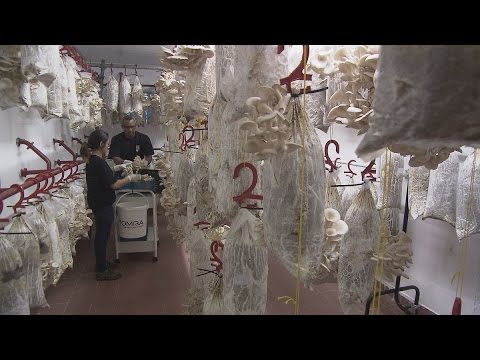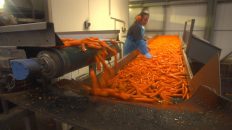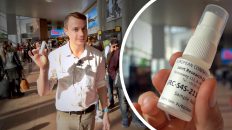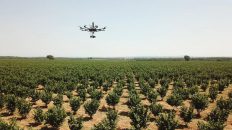Denis Loctier, euronews: “Nature and traditional agriculture could feed our ancestors, but today there are seven and a half billion people on the planet. Our urbanised society needs new technologies.”
In a special edition of Futuris, we investigate how scientists and engineers are helping farmers, entrepreneurs and industrialists across Europe.”
Busy as a bee
Alexandros Gousiaris manages 700 hives at his apiary in central Greece. Each hive needs to be checked regularly for indicators of the bees’ well-being.
The mathematician turned beekeeper helped to develop a smartphone app that simplifies these inspections.
Alexandros Gousiaris, beekeeper: “This mobile app gives us, the beekeepers, two digital assistants: one accompanies us when we work in the field, and the other is useful back home, where you can access it through the web.”
The voice-operated app Beenotes asks a set of questions about each hive. The beekeeper replies using a hands-free system and the answers are automatically filled into a Cloud database.
Alexandros Gousiaris: “If I were just using a voice recorder, I would need to listen to eight hours of recordings every day after I returned home. This is not necessary anymore. With this app, you don’t spend much time, or any at all, playing back your recordings.“
Developed with support from a European research project, the app’s interface helps the beekeeper to analyse the data and efficiently manage the apiary – for example, in disease prevention or in the selection of bee colonies for reproduction.
Nassos Katsamanis, Speech Technology Engineer, CTO, Beenotes: “The point is that it allows the beekeeper to choose the best honeybees with the best queens in order to reproduce them, year after year. So, step by step, the total number and the quality of bees improve.”
The software, still in development, currently works in several languages and is being used by hundreds of beekeepers in Europe, the Americas, Africa and Australia – a true gathering of statistics and minds to allow both developers and end-users to improve their operations.
Nassos Katsamanis, Speech Technology Engineer, CTO, Beenotes: “It’s the first time that beekeepers are able to collect data on such a large scale. Bringing these beekeepers together really helps us to develop the technical intelligence that we need in order for apiculture to open a new chapter, to move forward in the future.”
Processed improvement
Denis Loctier, euronews: “Smoked meat and sausages may be delicious but they are not fit for every diet. Can industrially processed food become healthier while preserving its appetising taste?”
A meat company in Catalonia, Spain is the country’s oldest producer of traditional products such as Serrano ham, salami and chorizo, but it’s open to innovation. It joined another European research project to develop low-fat and low-salt alternatives to its products.
Jordi Buxeda, Technical Manager, Boadas 1880: “To manufacture both the traditional and low-fat chorizo, we use the same type of pork meat of the highest quality; the essential difference in the low-fat recipe is it only contains 3% fat.”
Traditional chorizo can contain around 30% fat, which gives it its distinctive taste and texture. In the new, healthier recipe, the animal fat is replaced with a specially developed sunflower oil emulsion.
Jordi Buxeda: “One of the main objectives of the project was to obtain the traditional taste of chorizo, so we had to make more than 70 different tests to achieve the final result.“
The company says its new chorizo – with 60% lower fat and 40% lower salt – has been well received by consumers looking for healthier food options.
Apparently it tastes rather similar to the traditional one, but to be more certain of such claims, can taste actually be measured?
Taste tests
That’s a goal of the scientists at the French National Institute for Agricultural Research (INRA) in Dijon. Here they are conducting lab tests to study consumers’ perception of reformulated products developed by food manufacturers in various countries.
Christian Salles, Food chemist, INRA; TERIFIQ project coordinator: “We worked on cheeses, meats, cakes and sauces, and the challenge has been difficult because, in general, some ingredients are multi-functional in food – that is to say, for example, the salt will not only act on the salty flavour, it will also affect the aromas that will be released, it will affect the texture of the product and the shelf life.”
Changing the recipe alters the complex chemistry of food flavour. This instrument measures individual aroma compounds which are released while the test subject chews a food sample. The effect of new production processes on food flavour is then accurately recorded.
Etienne Sèmon, food chemist, INRA: “The process will influence the proportion of certain molecules in relation to others, so maybe these flavours, how they will be released, will be perceived differently. It’s at this moment that we need the self-gratification information from the food taster’s perception.“
Isabelle Andriot, Food chemist, INRA: “This product is salty, and there is also a little note of fat in the aftertaste. There you have it, it’s not bad.”
Waste no more
Denis Loctier, euronews: “Eat local” is a popular slogan for those who take pride in their own health, as well as the welfare of farmers and the environment. But is it possible to grow food in the heart of a city? In Rotterdam, sociologists are examining a good example of this exact approach.”
The coffee machines in a typical office building can produce a tonne of coffee grounds each month. This waste has more than 99% of the original compounds of roasted beans and contains valuable nutrients.
A local startup recognised this as a valuable resource and now collects coffee waste from around the city to reuse it.
Sandra de Haan, Business Development Manager, RotterZwam: “You can do lots of things with it – you can throw it in your garden for more nutrition for your plants, and we grow food out of it. And normally in Rotterdam, coffee waste is just normal waste, and it goes into the incinerator.”
The grounds are turned into a substance from which mushrooms are grown. This example of urban farming is one of the subjects of a European sociological study looking for sustainable ways to generate food provisions closer to urban dwellers.
Jan-Willem van der Schans, Sociologist, Wageningen UR: “The people are alienated from the way the food is produced – therefore they don’t want to pay for it, they
don’t know what is healthy for them, and all these problems are related to the separation. And with urban agriculture we try to integrate food production and food consumption again, and then hopefully the problems of the traditional food system are also going to be solved.”
Every month, a team of seven produces 400 kg of oyster mushrooms for local restaurants. They also organise training courses for new mushroom growers. It’s a business strategy that fully relies on the advantages of urban supply and demand.
Sandra de Haan: “When you compare it to a typical, normal dinner – the products went about 10,000 km around the world to end up on your plate. And by producing it in the city, we can reduce that to maybe 10 kilometres.”
Jan-Willem van der Schans: “You really have to think about what the city needs, and try to adapt to that. And we developed several strategies, how you can really distinguish yourself from the conventional food chain, how you can really make a difference to the city. And that’s the way to go forward, I think.”
A thriving market
Another subject of the same study is the Kalnciema Street Quarter in Riga, Latvia.
Grouped around 19th-century wooden buildings – with UNESCO heritage status – it’s a creative hub that formed from the desire to preserve the local food stalls.
Mikelis Grivins, Sociologist, Baltic Studies Centre: “This is the only place in Riga where you actually can see that a market has managed to sustain itself and function for several years. So from a research perspective, that’s really interesting – why? Why others fail, while this market actually is doing so great?”
In Latvia, as in many countries, farmers markets are disappearing, unable to compete with supermarket chains. In contrast, Kalnciema is thriving, attracting 100,000 visitors per year – a large number for Riga.
What is its secret?
Ilona Kunda, Sociologist, Baltic Studies Centre: “It’s about experience, I would say – of course, that’s the modern trend, you try to create an experience and in fact you can’t create it yourself, it can be only co-created. People here are active participants of what this place is.”
Sociologists found that free cultural events – art exhibits, concerts and film viewings, and even activities for children – helped to bring the community together around the shared values of safeguarding cultural heritage and healthy and sustainable living, something that supermarkets can’t offer.
Talis Tisenkopfs, Sociologist, Baltic Studies Centre: “The enigma of the place – and this extraordinary input from culture into food provisioning systems in urban environments. This is amazing how much you can propel and accelerate good food coming into the city by the means of culture, and I would say also leisure.”





